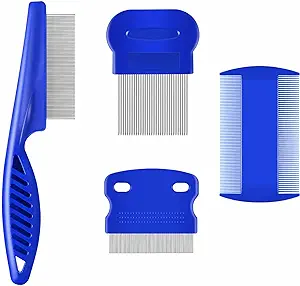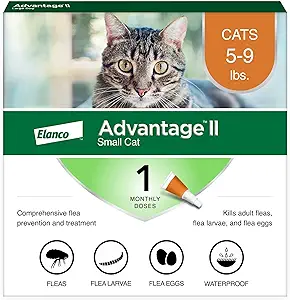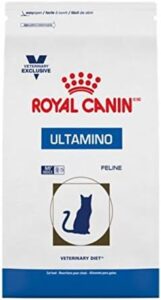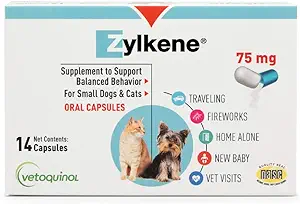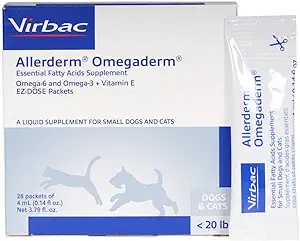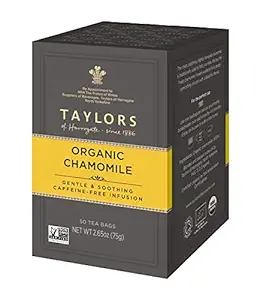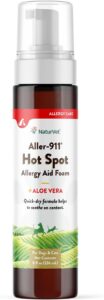Your cat is scratching himself - why is that?
As a result of a problem in your cat’s skin, a signal is created at the nerve endings. The nerve transmits this signal via the spinal cord to your cat’s brain. This is where your cat becomes aware of the fact that he has an itchy chest. An idea will then arise in his brain as to what your cat can do to relieve the itching.
This can be licking, biting, rubbing against objects, etc. Your cat performs this action and the itch on his chest stops. That’s enough for just a little itch. But if there is a real problem, your cat will experience an itch on his chest again and again. And therefore perform actions again and again to relieve that itching in the chest. And that can get so bad that wounds appear on your cat’s chest.
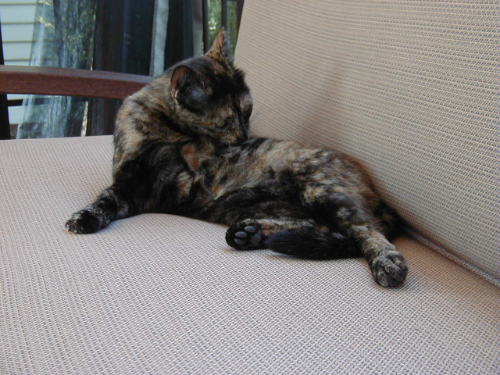
Causes why your cat has an itchy chest
In the vast majority of cases it is a flea problem. The fleas run and jump over your cat’s chest and this gives a stimulus to the nerve endings in your cat’s skin, causing your cat to experience an itchy chest. But there can also be mites, especially the scabies mite. And unfortunately, in many cases there is an allergy to food, fleas or environmental substances in the air. And sometimes it is simply an expression of stress. Below we discuss the causes in more detail.
Fleas on your cat
Fleas are small black insects that mainly live in the environment of your cat. So in his bed or blanket or in the cracks of your floor. They will only jump on your cat when they need food. They bite him and thus suck blood out of him. So it is not only walking and jumping that causes an itchy chest in your cat, but also the biting of these insects. You can use a flea comb to find the fleas.
In most cases you will certainly find a flea after you have thoroughly combed your cat with this comb. Or at least the flea droppings. These are small black grains that look like sand. However, if you put them on a white piece of paper and rub it with a wet finger, you will see nothing happen with sand, but with the droppings a red-brown smear will appear. In that case it is time for a flea treatment!
Mites are the cause for your cat to have an itchy chest
There are three mites in particular that cause medical problems in cats. But only one causes a real itch on your cat’s chest. And that is the Sarcoptes scabies mite. It lives in the superficial layer of your cat’s skin where it digs tunnels and eats the skin cells. This causes crusty lesions but also a lot of itching.
Detecting the mite is quite easy for your vet. In that case, they will take a scraping of your cat’s skin where the itchy chest is worst. They then spread the scrapings on a glass and view it under the microscope. The sarcoptic mite is quite easy to recognize and will still be wiggly and moving under that microscope.
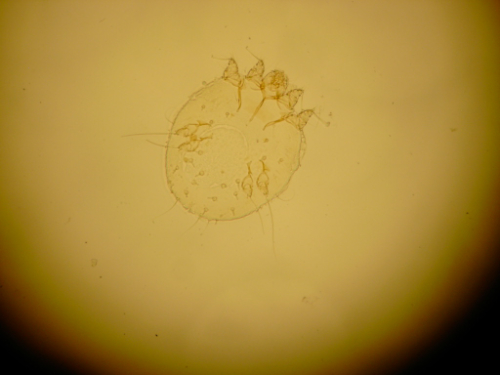
Unfortunately, mites do not die from flea medication. In this case, you will have to purchase stronger products if you want to be sure that they do not cause the problem of itching on your cat’s chest. You can only obtain these stronger remedies at the counter of your own vet (so without a consultation). These products also work against other mites, which cause less itching. And they also work against fleas. A separate flea treatment is therefore not necessary. You can also try if the less active natural Mange Relief for cats. But it is not as strong as the treatment you can buy at the vet.
Allergic reactions as a cause of chest itching in your cat
Flea allergy in your cat
As a result of allergic reactions, this can also be the cause for a cat to have an itchy chest. Unfortunately, there are different types of allergies. For example, you have a flea allergy, but this mainly causes itching complaints on your cat’s back, near his tail. Rarely do the complaints only affect his chest. A flea allergy is caused by an allergic reaction to the flea’s saliva. In this case it is not about the fleas just walking around. With a flea allergy, there are usually hardly any fleas to be found on your cat, unlike a “normal” flea infestation. But have you treated your cat with a flea or mite product? Then the itching on your cat’s chest should certainly go away after 10 days at the latest.
Food allergy in your cat
It is also possible that your cat is allergic to certain nutrients. As a result of these nutrients, inflammation occurs in your cat’s skin and these inflammations cause itching stimuli in the nerves. However, it is quite difficult to find out what your cat is allergic to.
First of all, you want to know whether or not there is a food allergy. Later you can try to find out what exactly he is allergic to. By first giving him a food to which he cannot have an allergic reaction, you can determine whether he has a food allergy. You can do this with Royal Canin Ultamino. This does not contain any substances that your cat can react allergically to. The proteins have been made so small that they do not fit on your cat’s immune cells. Your cat’s immune system does not recognize that proteins are coming in. While the rest of your cat’s body can use the proteins as building material. Furthermore, the carbohydrates also have been treated in such a way that your cat cannot have an allergic reaction to them.
How does a food allergy test work in your cat?
But you do need a bit of patience for this test. You must give the food to your cat for at least 8 weeks. And he is not allowed to receive anything other than that food. So no slices of cheese or ham or other treats! Really just that food. Do you feel like you can’t do that? Then there is no point in taking the food allergy test. Your cat should therefore only receive that special food.
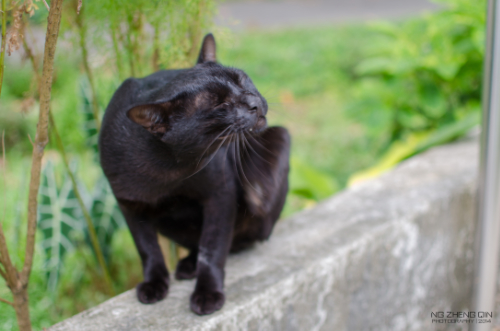
You will most likely not notice a difference for the first 4 weeks. The old proteins are still fully incorporated in your cat’s body. It takes about 3 weeks for them to get out. Then let the skin heal for another week. So only after 4 weeks will you see less itch on your cat’s chest if there is a food allergy. Do you still see no difference after 8 weeks? Then unfortunately that will never ever happen and there is therefore another cause for the fat that your cat has an itchy chest.
An atopic allergy in your cat
Your cat may also be allergic to things such as tree pollen, grass pollen, dust mites, etc. In that case we speak of an atopic allergy, also known as atopy. Unfortunately, you cannot do anything yourself to diagnose this allergy. Your vet can take some blood from your cat and send it to a laboratory for this to be determined. But in many cases, your vet will choose to give your cat medication against that itch on his chest. After all, you cannot remove pollen or mites from the air to suppress the allergy. So in most cases the medication will still have to be started after the test is done.
We have also seen on Amazon.com that a special test is for sale for home use. However, we have no experience with this ourselves and therefore do not know whether it works well.
Itching on your cat's chest due to stress.
Some cats regularly suffer from stress. And as a result of stress, all kinds of mechanisms are activated in your cat’s body that can cause your cat to have an itch on his chest. But it is also thought that it is not itching, but that your cat is trying to soothe itself by washing itself excessively. If you feel that your cat quickly suffers from stress and as a result has itchy chest, you can give him Zylkène tablets. This contains substances that will increase the Serotonin level in his brain, making him less sensitive to stress and feeling better about himself. The same substances are also included in Royal Canin’s Calm diet. So if you don’t like tablets, that might also be an option for you.
Which home remedy helps against an itchy chest
There are various remedies that can reduce mild itching on the chest of your cat. However, it will not solve severe itching.
Essential fatty acids
Essential fatty acids such as Omega-3 and Omega-6 fatty acids ensure optimal resistance of the skin to all kinds of external influences. This makes the skin much more powerful. It takes a while before it is properly incorporated into your cat’s skin and coat, but after a week or two you should start to notice a difference in your cat with an itchy chest.
Aloe vera
A small amount of pure, unscented aloe vera gel can be used to soothe the itch on his skin. Make sure that your cat does not lick the gel by using a medical pet shirt.
Good luck!
Hopefully we have given you enough information to relieve the itch from your cat’s chest. Good luck for the both of your!

